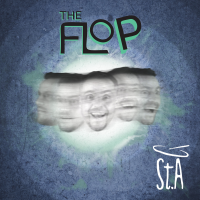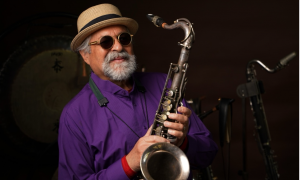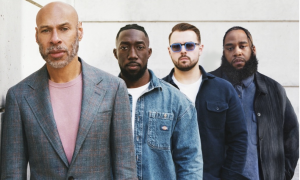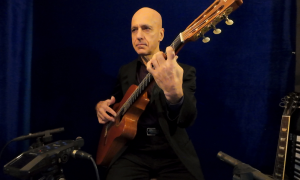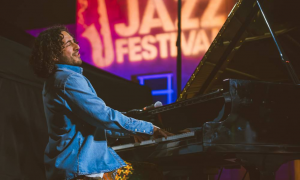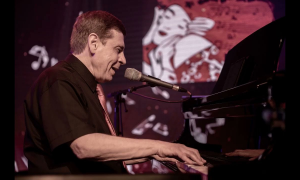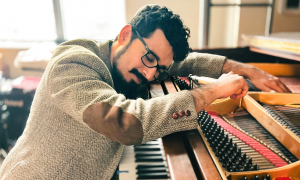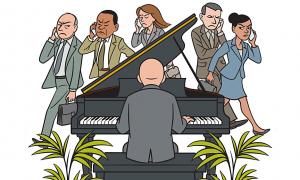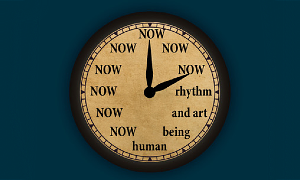In 1960, when drummer Philly Joe Jones was asked by jazz writer and critic Ralph J. Gleason for the name of his favorite drummer, Jones answered “Louis Hayes." Just 21 years old at the time, Louis had just ended a three-year stay with the Horace Silver Quintet to join the Cannonball Adderley Quintet. The parting was amicable, and the reason for the change, Silver said in his autobiography, was money. Silver paid all of his sidemen the same amount, and if one received more, others would soon be asking for the same.
Louis' albums and performances with Silver not only gave the drummer greater visibility but also put him in the upper echelon of the jazz world. Louis also had enormous influence over other drummers at the time, many of whom began de-emphasizing the thud of the bass drum in favor of the conversational cymbals, high-hat and snare. Louis' support was by no means light. His solos were carefully constructed.
In Part 3 of my three-part interview with Louis on his Horace Silver Quintet years, the drummer talks about his emergence as a major force on the drums, his approach on the instrument and working with Silver:
JazzWax: No one ever told you that you were doing a great job in the Horace Silver Quintet?
Louis Hayes: People were coming to me and saying these different things. When you're accepted by your peers, people like Miles Davis and John Coltrane, you know you're doing just fine. If the phone rings for work, that says it all [laughs]. Back then, you were measured by how often you got work and by the friends you were associating with. If certain people wanted you around, you were on a special level.
JW: What made hard bop stand out?
LH: To a point, the drummers. Drummers like Philly Joe Jones, Roy Brooks, Art Taylor and Art Blakey. That's who I was around at the time. I never sat down and tried to analyze it. For me, the beat just came out of my body. I was aware of r&b and learned to play it in Detroit but I didn't play in r&b bands. I loved jazz too much. Motown Records obviously didn't start until years later, but the elements were all being formed in Detroit when I was coming up in the early 1950s. In the thick of things, I learned how to play back beats and shuffles and Latin rhythms and mixed them into jazz. That's the hard bop sound.
JW: Who taught you the r&b beats?
LH: Clarence Stamp, my cousin. All of those rhythmic patterns were new at the time. I learned them as a kid. By the time I left Detroit, I knew how to play them with brushes, mallets, sticks—everything. When Horace wrote Senor Blues, I didn't think about how I was going to come up with a way to play that. It was just something that happened based on my experiences and by my responding naturally to how the tune went.
JW: Did Silver ever write out a drum part for you?
LH: No, he didn't have to. But I knew how to read music. My cousin had taught me. Everyone else in the group would have a part at first, though. I came up with the drum parts on my own.
JW: What did other musicians say when they heard your drum figures?
LH: Musicians would come up to me and ask, “Did Horace write that out? How did you put that together?" I'd tell them, “Of course not." When this is your art, you just know what, when and how. It becomes a way of speaking.
JW: Did Silver like to rehearse the quintet?
LH: Horace rehearsed more than Cannonball Adderley did after I joined his quintet in 1959. Horace rehearsed often so the group was always compatible. Some of the things we played the first time were a little difficult and odd. Like The Outlaw on Further Explorations in 1958.
JW: No sheet music?
LH: Not at all. I learned the music in my head. I knew how the tune went, every inch of it. Only then can you create. I have the ability to listen and know instinctively what to play. I've had drummers ask me, “How did you play The Outlaw?“ See, to me, it was just a thing. I had a format in my head and had worked it out. You have to know songs cold so you can make something out of them and do things that aren't there.
JW: When you were in Silver's group, who in the quintet did you listen most while you were playing for inspiration?
LH: I listened to everyone. But at certain times, someone might play something that grabbed my attention and I'd decide to go a different way from what I was thinking. When you play the drums, you can adapt to each soloist's personality. I didn't really try to accompany anyone. They have to follow me. You have two choices on any tune. You can accompany whoever is soloing or you can take charge and have them feed off of what you're doing.
JW: But Silver's percussive left hand had to be somewhat inspirational, no?
LH: Oh, yes, sure. Horace to me was such a unique pianist. His direction, the way he accompanied and the way he soloed. When you are fortunate to have the ability to sound different than most people, that is a real gift. Horace sounded different than most pianists. Listening to the way he constructed his solos and accompanied someone was so special. He played a major role in the way I played. I was listening mostly to his rhythmic patterns more than the melody. Those patterns were strong and made it comfortable for me to play a certain way and find my voice.
JW: How did those patterns make you comfortable?
LH: Horace played in a way that was so busy, with so much time and rhythm and bounce going on. That helped me get stronger as a drummer, to raise my game and to take more creative risks. But there were no empty spaces. You had to be on the go and thinking the entire time. His playing was about excitement and that made the group stronger and more powerful.
JW: What about the horns?
LH: Horace wrote them tight. There were no head charts. Horace wrote interludes and had whole compositions written out for the horns. When Horace wrote something, you knew immediately it was his. He had that tight snap and harmonies that hooked you.
JW: Did Art Blakey ever comment on your playing?
LH: Not to me directly. I know that he felt very good about me, though, and liked what I was doing. And he always wished me the best. I know his playing had an effect on mine. Each drummer who plays well has something that's unique. Art [pictured] could give arrangements a personal rhythmic touch better than anyone. You could put on a record of his and there would be no mistaking who was playing the drums. He put his stamp on everything he played.
JW: Did his overall style influence you?
LH: I never felt like trying to play like anyone else. That was too hard. But I did like little things that I heard by Art but also Buddy Rich, Gene Krupa and others. Gene once gave me a cymbal as a gift.
JW: No kidding?
LH: Seriously. When you're in the company of these people, they look and watch and listen to you. Everyone wants to know what everyone else is doing. When you're accepted by the best, it's an amazing thing. The Horace Silver Quintet could hold its own with any group. Knowing that made me very comfortable.
JazzWax tracks: Louis Hayes first album as a leader was Louis Hayes Featuring Yusef Lateef and Nat Adderley (1960) for Vee-Jay Records. Rounding out the quintet were Barry Harris on piano and Sam Jones on bass. The hard bop ensemble recorded originals by Yusef, Cannonball Adderley, Barry Harris and Nat Adderley. This is a terrific album. Louis unleashes a range of terse, commanding and inventive figures but never overplays. You'll find this album at iTunes and here.
JazzWax clip: Here's all you need to know about Louis Hayes. This is from a European tour by the Cannonball Adderley Quintet in 1963...
Louis' albums and performances with Silver not only gave the drummer greater visibility but also put him in the upper echelon of the jazz world. Louis also had enormous influence over other drummers at the time, many of whom began de-emphasizing the thud of the bass drum in favor of the conversational cymbals, high-hat and snare. Louis' support was by no means light. His solos were carefully constructed.
In Part 3 of my three-part interview with Louis on his Horace Silver Quintet years, the drummer talks about his emergence as a major force on the drums, his approach on the instrument and working with Silver:
JazzWax: No one ever told you that you were doing a great job in the Horace Silver Quintet?
Louis Hayes: People were coming to me and saying these different things. When you're accepted by your peers, people like Miles Davis and John Coltrane, you know you're doing just fine. If the phone rings for work, that says it all [laughs]. Back then, you were measured by how often you got work and by the friends you were associating with. If certain people wanted you around, you were on a special level.
JW: What made hard bop stand out?
LH: To a point, the drummers. Drummers like Philly Joe Jones, Roy Brooks, Art Taylor and Art Blakey. That's who I was around at the time. I never sat down and tried to analyze it. For me, the beat just came out of my body. I was aware of r&b and learned to play it in Detroit but I didn't play in r&b bands. I loved jazz too much. Motown Records obviously didn't start until years later, but the elements were all being formed in Detroit when I was coming up in the early 1950s. In the thick of things, I learned how to play back beats and shuffles and Latin rhythms and mixed them into jazz. That's the hard bop sound.
JW: Who taught you the r&b beats?
LH: Clarence Stamp, my cousin. All of those rhythmic patterns were new at the time. I learned them as a kid. By the time I left Detroit, I knew how to play them with brushes, mallets, sticks—everything. When Horace wrote Senor Blues, I didn't think about how I was going to come up with a way to play that. It was just something that happened based on my experiences and by my responding naturally to how the tune went.
JW: Did Silver ever write out a drum part for you?
LH: No, he didn't have to. But I knew how to read music. My cousin had taught me. Everyone else in the group would have a part at first, though. I came up with the drum parts on my own.
JW: What did other musicians say when they heard your drum figures?
LH: Musicians would come up to me and ask, “Did Horace write that out? How did you put that together?" I'd tell them, “Of course not." When this is your art, you just know what, when and how. It becomes a way of speaking.
JW: Did Silver like to rehearse the quintet?
LH: Horace rehearsed more than Cannonball Adderley did after I joined his quintet in 1959. Horace rehearsed often so the group was always compatible. Some of the things we played the first time were a little difficult and odd. Like The Outlaw on Further Explorations in 1958.
JW: No sheet music?
LH: Not at all. I learned the music in my head. I knew how the tune went, every inch of it. Only then can you create. I have the ability to listen and know instinctively what to play. I've had drummers ask me, “How did you play The Outlaw?“ See, to me, it was just a thing. I had a format in my head and had worked it out. You have to know songs cold so you can make something out of them and do things that aren't there.
JW: When you were in Silver's group, who in the quintet did you listen most while you were playing for inspiration?
LH: I listened to everyone. But at certain times, someone might play something that grabbed my attention and I'd decide to go a different way from what I was thinking. When you play the drums, you can adapt to each soloist's personality. I didn't really try to accompany anyone. They have to follow me. You have two choices on any tune. You can accompany whoever is soloing or you can take charge and have them feed off of what you're doing.
JW: But Silver's percussive left hand had to be somewhat inspirational, no?
LH: Oh, yes, sure. Horace to me was such a unique pianist. His direction, the way he accompanied and the way he soloed. When you are fortunate to have the ability to sound different than most people, that is a real gift. Horace sounded different than most pianists. Listening to the way he constructed his solos and accompanied someone was so special. He played a major role in the way I played. I was listening mostly to his rhythmic patterns more than the melody. Those patterns were strong and made it comfortable for me to play a certain way and find my voice.
JW: How did those patterns make you comfortable?
LH: Horace played in a way that was so busy, with so much time and rhythm and bounce going on. That helped me get stronger as a drummer, to raise my game and to take more creative risks. But there were no empty spaces. You had to be on the go and thinking the entire time. His playing was about excitement and that made the group stronger and more powerful.
JW: What about the horns?
LH: Horace wrote them tight. There were no head charts. Horace wrote interludes and had whole compositions written out for the horns. When Horace wrote something, you knew immediately it was his. He had that tight snap and harmonies that hooked you.
JW: Did Art Blakey ever comment on your playing?
LH: Not to me directly. I know that he felt very good about me, though, and liked what I was doing. And he always wished me the best. I know his playing had an effect on mine. Each drummer who plays well has something that's unique. Art [pictured] could give arrangements a personal rhythmic touch better than anyone. You could put on a record of his and there would be no mistaking who was playing the drums. He put his stamp on everything he played.
JW: Did his overall style influence you?
LH: I never felt like trying to play like anyone else. That was too hard. But I did like little things that I heard by Art but also Buddy Rich, Gene Krupa and others. Gene once gave me a cymbal as a gift.
JW: No kidding?
LH: Seriously. When you're in the company of these people, they look and watch and listen to you. Everyone wants to know what everyone else is doing. When you're accepted by the best, it's an amazing thing. The Horace Silver Quintet could hold its own with any group. Knowing that made me very comfortable.
JazzWax tracks: Louis Hayes first album as a leader was Louis Hayes Featuring Yusef Lateef and Nat Adderley (1960) for Vee-Jay Records. Rounding out the quintet were Barry Harris on piano and Sam Jones on bass. The hard bop ensemble recorded originals by Yusef, Cannonball Adderley, Barry Harris and Nat Adderley. This is a terrific album. Louis unleashes a range of terse, commanding and inventive figures but never overplays. You'll find this album at iTunes and here.
JazzWax clip: Here's all you need to know about Louis Hayes. This is from a European tour by the Cannonball Adderley Quintet in 1963...
This story appears courtesy of JazzWax by Marc Myers.
Copyright © 2025. All rights reserved.







